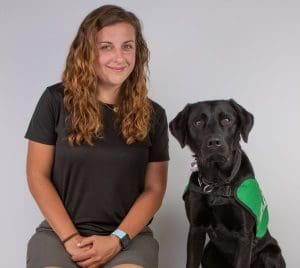Breed focus: The sociable and kind-hearted Labrador
Ah, Labradors. Their energy for life is contagious and they’re endlessly kind-hearted, sociable and playful. Find out more about this super popular and lovely breed and see if it sounds like the right fit for you.

The Labrador is a member of the gun dog group, which was originally bred to find and retrieve shot game. This means Labradors are often highly motivated to hold objects. From a young age they will pick up and carry their toys (very cute). This natural desire to retrieve is particularly useful as assistance dogs as our clients may need help to pick things up or to retrieve important items like a phone.
They are usually yellow, black, chocolate brown or fox red in colour. Scientifically, there is no proven difference between yellow, black, chocolate, and fox-red Labradors. However, having trained hundreds of Labradors to help people with all manner of support needs, we’ve noticed a few subtle contrasts between them.
Practical experience shows us that chocolate Labradors have very big characters and a higher level of drive. Their fox-red cousins have even more drive, which is typically too much for the needs of our clients. So, with the odd exception, we tend to train mainly black and yellow Labradors.
As a working dog, Labradors can be robust and independent. Most also love to be in or near water and will happily retrieve things from a pond or the sea.
As a breed, they share traits, but they have individual personalities too. As with training any dog, getting to know these individual traits is important so you can set your dog up for success.
Labradors are easy to motivate because they’re willing to do almost anything for a food reward! They are therefore fairly easy to train either as a family dog or as a life-changing assistance dog.
Things to consider before getting a Labrador:
- As a medium to large breed, they can grow to 30-40kg so do bear this in mind
- They have a double coat and while it’s short haired, they do still moult and need grooming on a regular basis
- Labradors thrive on being around people so they can’t be left alone for long periods of time
- The amount of energy Labradors have isn’t always suited to everyone — it needs an outlet!
- Labradors are water dogs, so keeping them happy is easy just by splashing in puddles and lakes!
- With any large breed, it’s important when they’re younger to take care when they exercise. Since their bones are still developing, excessive running and jumping, boisterous play with other dogs or even going up and down the stairs too much can negatively affect their development
Training Labradors

Dogs for Good trainer, Kat, is a big fan of Labradors: “All you have to do is look at a Labrador and they wag their tail! They have a friendly nature and enjoy being in the company of their human handler,” she says. “They’re an intelligent breed and enjoy training. They look for human interaction, so training is the perfect way to do this.”
Kat says Labradors are great because they can be both working dogs and family dogs. “They have the energy needed for a working dog, but also have the ability to be calm as a family dog,” she says.
Learn more about how we train our assistance dogs, including Labradors.
Known health issues in Labradors
- Joint problems such as hip or elbow dysplasia.
- Obesity. Being overweight may exacerbate joint problems so it’s essential you feed your dog the right amount of a quality dog food and give them lots of exercise.
- Bloat – Labradors are prone to bloat due to their deep chests and likelihood to gulp food quickly.
- Ear problems – more common in floppy-eared breeds. Check regularly to monitor for infection and dry thoroughly after swimming and bathing.
Help support our life-changing work...
Imagine if everyday tasks were so challenging or physically demanding they affected your quality of life. For many people living with a disability of families with a child with autism, that is their reality. Now imagine if a specially trained four-legged friend could restore your, or your family’s, independence.
The demand for our services is high and we can’t help as many people as we would like to without more funding. Please help us continue to bring people and dogs together to help make everyday life possible in so many extraordinary ways.
Every contribution, whatever size, is important and helps us make a difference.

